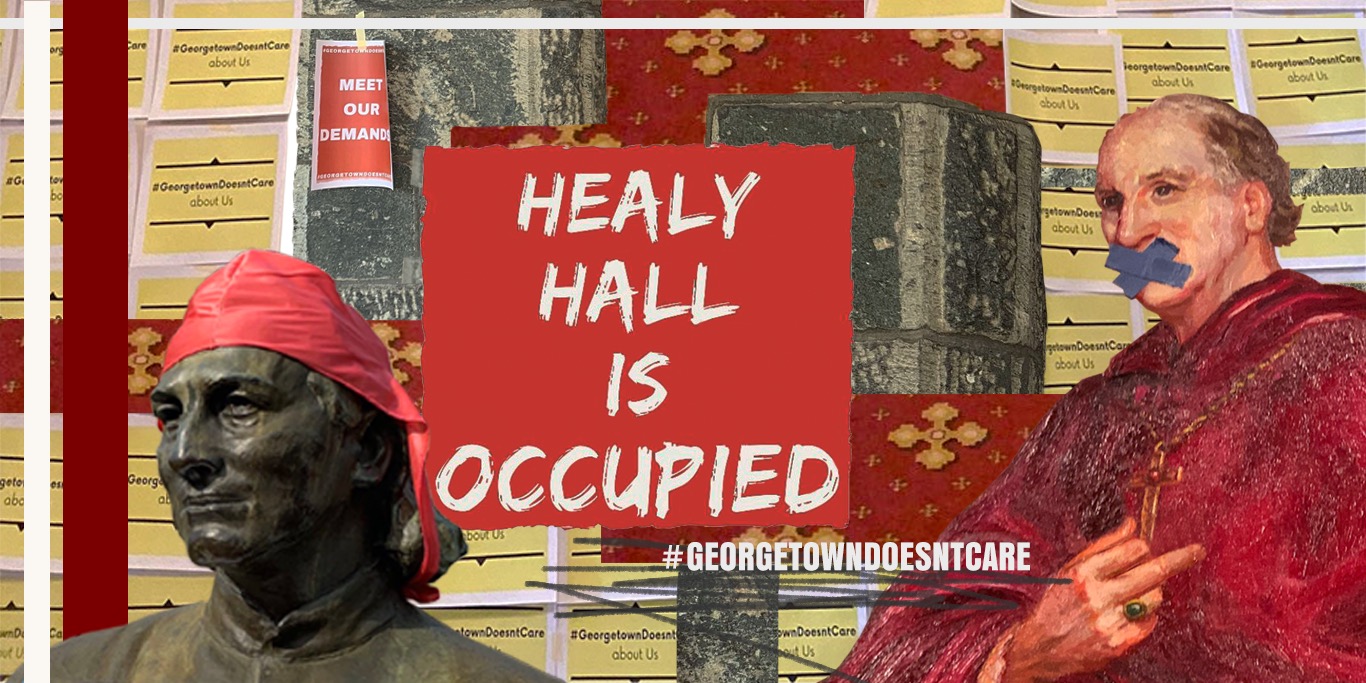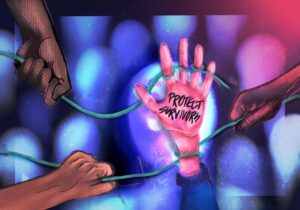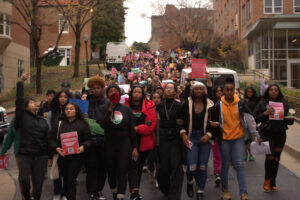Content warning: This article discusses sexual assault
For Georgetown’s survivors of sexual assault, sometimes direct action is the only way to get results. When members of the Black Survivors Coalition (BSC) occupied Healy Hall on Feb. 24, they planned to remain until the administration met their demands for improved sexual assault resources. They would be there for five days, from 9 a.m. to midnight, spending a total of 76 hours in the chandelier-lit lobby of University President John DeGioia’s office.
While the BSC’s sit-in gained the attention of the administration and resulted in commitments for the hiring of clinicians of color, an expanded SafeRide program, and more resources for the Women’s Center, the movement still has a long way to go in achieving all their demands.
The BSC was founded in the fall of 2019 to advocate for improved on-campus sexual assault resources, especially for black, femme, and nonbinary-identifying survivors. The movement stems from student frustration after years of ignored requests for adequate resources designed to serve black and nonbinary survivors of sexual assault.
While the BSC includes members from many on-campus communities, it specifically encourages marginalized groups to speak for themselves. “My philosophy is that when you help the people who are most marginalized, when you help black women and nonbinary people, you are helping everyone,” Makayla Jeffries (COL ’23) said. “When you think about the social hierarchy, black women and black nonbinary people are at the bottom.”
In a university-wide statement, DeGioia reaffirmed the university’s dedication to caring for its black students. “A commitment to the flourishing of each member of our community is inextricable from our understanding of our past, our present, and the enduring and persistent legacies of slavery, segregation, discrimination, and other forms of exclusion that have marked our history,” DeGioia wrote.
Despite criticism from the BSC, the university has made efforts to address on-campus sexual assault. Sarah Onori was hired as the new Title IX and Civil Rights Investigator and began working on-campus in February 2020. Bystander training has also been made a mandatory requirement for all first-year students. In an effort to support different identities on-campus, the university launched a Campus Climate Survey which closes on April 24. Counseling and Psychiatric Services (CAPS) announced the hiring of new clinicians of color who will begin working on-campus this fall. The university also established a $10,000 fund in 2019 for students to seek mental health resources off-campus.
The BSC may be the newest advocacy group for sexual assault resources, but it is only the latest organization in a chain of sexual violence-related student activism. The BSC is the descendent of the STOP Coalition, which petitioned the university for improved sexual assault resources during the 2018-2019 academic year. When the administration failed to adequately respond to the STOP’s demands, students reinvigorated their efforts through a new movement, which specifically advocated for those they believe are most affected by the university’s inaction. Maya James (COL ’20) pointed out that student advocacy for sexual assault resources is not a new phenomenon, and has been occurring since she arrived as a freshman on-campus four years ago.
“It is a myth that protests have just now started,” James said. “Something needs to change. Students cannot be expected to keep up with the demands of the university while also forcing administration to care about our wellbeing.”
According to the Association of American Universities (AAU) Climate Survey, Georgetown has higher rates of sexual violence than its peer institutions. In the 2019 survey, 31.6 percent of undergraduate women at Georgetown reported experiencing sexual assault compared to the AAU aggregate of 25.9 percent. Male students at Georgetown reported a 11.6 percent rate compared to an AAU aggregate of 9.6 percent, and LGBTQ identifying students reported a 31.3 rate compared to an AAU aggregate of 20.3 percent.
Despite the university’s implementation of prevention programs like mandatory bystander training for incoming students, rates of sexual assault recorded in the 2019 Sexual Assault and Misconduct Climate survey are similar to the ones recorded in 2016. Leaders of the BSC feel this problem is especially prevalent in marginalized communities. “It is about a much more general problem of sexual violence on campus, especially against black women and nonbinary survivors,” Kayla Friedland (COL ’22) said.
Because most sexual assault cases occur at night, universities around the country offer 24/7 services for survivors. George Washington University has a round the clock Sexual Assault Response Consultative team to aid survivors. Georgetown, in contrast, directs students to a national sexual assault hotline, the Rape, Abuse, and Incest National Network. CAPS and Health Education Services run only a 9 to 5 schedule.
***
Jeffries first realized she was a survivor of sexual assault during her first semester on campus in fall 2019. “This is the first time I have been in a space where people talk about sexual assault, so I didn’t even realize that I had been sexually assaulted,” Jeffries said.
While Jeffries went to seek help from CAPS and Health Ed, both offices were too understaffed to help her. With nowhere to turn, Jeffries helped create the BSC to advocate for herself and other Georgetown survivors of sexual assault. “This campaign has been me processing my trauma while fighting for resources because there is nowhere else to go,” Jeffries said.
The BSC unites veterans of the STOP Coalition with first-year students like Jeffries and Leah Miller (COL ’23) who hope their activism will no longer be necessary by the time they are seniors. “I am here to show the university that this shit won’t continue, because it has been continuing so long,” Miller said.
“I do not want that to be me, where I am a senior and I am still looking at a Women and Gender Studies program and not a department. Still looking at CAPS drastically understaffed without black clinicians, without anyone that is understanding black survivors. Without resources for mental health and black survivors off-campus,” Miller said. “I do not want to be a senior searching for that stuff and seeing my friends still hurting.”
The BSC kicked off their campaign by delivering a letter titled #GeorgetownDoesntCare to DeGioia’s office on Jan. 27 with a list of 10 demands for improved resources. The demands included calls for Georgetown to hire more black clinicians to serve black survivors, expand existing resources such as the Women’s Center, and develop the Women’s and Gender Studies (WGST) program into an established department.
The letter also petitioned for a 24-hour crisis response center and expanded hours for CAPS and the Student Health Center. Other demands included the expansion of the SafeRides program to reduce student wait times. The BSC asked that no students be hired as SafeRide drivers or student guards if they are under investigation by Title IX or charged with sexual assault.
James doesn’t see any of these requests as revolutionary.
“There is nothing radical, extreme, or partisan about the list of demands, nor are these demands anything new. The coalition is simply asking for basic resources that students should not have to use their valuable time advocating for,” James said. “Too many of us know someone who has experienced violence on campus, and so much of it goes unreported,” she added.
While the first demand asked for a public response from the administration by Jan. 31, the university only emailed their initial response to leaders of prominent black organizations on campus. After what was deemed just another inadequate response in a history of university inaction, coalition members gathered in Red Square on Feb. 21 to openly protest an administration that they felt did not take their demands seriously.
“Survivors united will never be divided. Administration you can’t hide, we can see your greedy side,” protesters chanted before groups of prospective students on campus tours.
“We are here today because there have been multiple incidents of gender violence in our community. In the black community especially, with Georgetown ignoring the voices and cries for help by black women survivors,” said Norman Francis Jr. (COL ’20), former GUSA president. “Time and time again, Georgetown University fails to give them the resources they both need and deserve.”
Although students have petitioned the university through institutional structures such as GUSA, the BSC believes that sit-ins and protests are necessary to make the university take their demands seriously. “I have been working with the administration for the entire last year, and for them to come at me, look me in the eye, and tell me they don’t have anything more, they can’t give us more resources? Fuck that,” Francis Jr. said.
“This work has already begun, and we are committed to continuing this, improving our University processes, and building trust within our Georgetown Community and will do so in partnership with our students,” a university spokesperson said.
Still feeling ignored, BSC decided the only way to achieve their demands was through escalated action. Over the week of occupying Healy Hall, protestors met with administrators to discuss their demands, including DeGioia, Vice President of Student Affairs Todd Olson, Vice President of Institutional Diversity and Equity Rosemary Kilkenny, Dean of Georgetown College Christopher Celenza, CAPS Director Phil Meilman, and GUPD Chief Jay Gruber.
Student demonstrators were excited that their movement was resulting in productive conversations with senior administrators, and they believed their direct actions were necessary to bring the university to the negotiating table. “I am not particularly upset about doing activism,” Miller said. “I am upset it is about such fundamental stuff that should have been addressed, and has been asked for before, and has been dismissed for so long.”
As the sit-in continued, the coalition gained more support from the Georgetown community, including professors, such as Sara Collina, a WGST adjunct professor. “I think every member of our community should be finding ways to make this most intellectually exciting, loving, kind and inclusive campus in the world,” Collina said.
After five consecutive days of negotiations with the administration, the BSC’s demands were acknowledged in a university-wide email from Kilkenny. In response to the demand for more black clinicians, the administration announced the hiring of LaTasha Smith from Vassar College, who will begin working at Georgetown in the fall. In the interim, the university has hired ten women of color health providers to offer free counseling services from March 16 to May 15. In light of the university transition to digital learning, CAPS will allow virtual sessions as long as healthcare providers are allowed to practice in a student’s state.
An ensuing email from DeGioia announced a framework to address the demands and included timelines to keep the administration accountable.
After discussions with the protestors, the administration committed to quarterly reports to update the BSC on its progress fulfilling their demands. “Our students described experiences of trauma and pain that are profoundly at odds with the institution that we are trying to be,” DeGioia said. “We are determined to enhance our campus climate so that students can feel a deep sense of belonging,” he added.
In DeGioia’s statement, the administration committed to increasing resources for the Women’s Center by advertising a newly created position for a gender-based violence specialist, promising to fill the position by the end of the academic year. In response to the demand for a WGST Department, Celenza committed to hiring a program director and pursuing a department once eight full-time and tenured professors have joined the program.
The university also committed to add a third SafeRide van by March 2 after one of the vans broke down. A fourth van was added to run on Monday, Tuesday, and Wednesday, the nights when vans are most in demand. According to the university’s public response to the coalition, student guard and saferide driver applicants would not be hired if found responsible for sexual misconduct or involved in an ongoing investigation.
Members pointed out that the coalition’s success in gaining the university’s attention was largely due to the movement’s escalated action. “The only reason they are responding to the demands is that they have been forced to,” Friedland said. “We are now at their doorsteps and we are actively making them uncomfortable. But it is what we have to do to get progress.”
While the university agreed to some of the demands, coalition members plan to continue protests until each demand is fully met. The administration did not commit to the establishment of a 24-hour crisis center or a WGST Department. While the university committed to seeking donations specifically for an off-campus mental health stipend, the administration committed $15,000 per year to the fund. Student protestors expressed dismay that, with an average cost of $150 per therapy appointment in D.C., $15,000 could only fund approximately 100 appointments. “Students are having to go off-campus because our mental health resources are so bad. But people aren’t going to be going to therapy for five sessions, it is an ongoing thing,” Francis said.
In a university-wide statement on April 1, Kilkenny updated students on new steps the administration has taken to fulfill BSC’s demands. A list of GUPD officers who have completed implicit bias training has been posted publicly on GUPD’s website. GUPD is also offering paid summer positions to current juniors or seniors to aid in additional officer diversity and implicit bias training. Kilkenny also announced that CAPS has hired four permanent, full-time clinicians who will begin working at Georgetown this summer.
A university steering committee has also met with consultant Shannon Collins, an expert on gender-based violence, to develop a Community Coordinated Response Team (CCRT). The CCRT program will aim to provide a more trauma-informed approach to responding to on-campus sexual assault and gender violence.
While not all of their demands have been fully met, members of the coalition are optimistic that the university is beginning to take their requests seriously. “I think they are starting to respond to our demands. At least, if I am taking them by their word. I hope I can faithfully keep that trust in them. But at the end of the day, this should not have had to happen,” Jeffries said.
Although BSC protests are on pause due to the university’s announcement that classes will be conducted remotely through the end of the semester, coalition members are determined to maintain their momentum over the summer and into the next academic year.
“The work will not end,” James said, “until survivors feel safe on campus, participate fully in the university without fear of retaliation and contact with their perpetrators, and graduate without having to share a stage with perpetrators.”
Confidential Resources:
Health Education Services (HES): sarp@georgetown.edu
Counseling and Psychiatric Services (CAPS): (202) 687-6985; after hours, call (833) 960-3006 to reach Fonemed, a telehealth service; individuals may ask for the on-call CAPS clinician
DC Rape Crisis Center: (202) 333-RAPE (24/7 hotline)
Rape, Abuse, and Incest National Network (RAINN): 1-800-656-HOPE (24/7 hotline)
Title IX Online Reporting Form: georgetown.protocall.info/incident-report.








[…] Black Survivors Coalition Pushes the Boundaries of Student Activism The Georgetown Voice […]
[…] across the subject. GUSA, the Black Survivors Coalition, and numerous pupil golf equipment have advocated for an growth of CAPS providers and help, better illustration of communities of shade and LGBTQ […]
[…] the concern. GUSA, the Black Survivors Coalition, and quite a lot of pupil golf equipment have advocated for an enlargement of CAPS companies and help, better illustration of communities of colour and […]
[…] activism around the issue. GUSA, the Black Survivors Coalition, and a number of student clubs have advocated for an expansion of CAPS services and support, greater representation of communities of color and […]
[…] the challenge. GUSA, the Black Survivors Coalition, and quite a lot of scholar golf equipment have advocated for an growth of CAPS companies and help, higher illustration of communities of coloration and […]
[…] the push for more Black clinicians put forth by the Black Survivors Coalition (BSC) as part of the #GeorgetownDoesntCare campaign. Overall, the campaign seeks to increase campus resources for Black women and non-binary survivors […]
[…] the push for more Black clinicians put forth by the Black Survivors Coalition (BSC) as part of the #GeorgetownDoesntCare campaign. Overall, the campaign seeks to increase campus resources for Black women and non-binary survivors […]